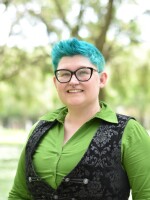"I think the joy I feel comes from being able to live my gender identity, being able to be honest with myself and the people I love. When I enter spaces and I'm, you know, for one way or another 'presenting trans,' so to speak.
It can be scary, but I'm, more often than not, thankfully, met with either very neutral exchanges, which I'll take every day, or, you know, very wonderful exchanges and acceptance. And the joy in that and being able to have that be a reality for me, in comparison to the fear I felt growing up and the isolation I felt growing up in a rural community, I feel joy by being able to value that.
I mean, this is just sort of the idea that in my head, as a nonbinary person, I give myself the permission to have no limits, you know, the limits that exist just societally. So if that day, that means a dress ... oftentimes, it means just sort of abnormal pairings, that maybe they challenge people's preconceived notions of my gender.
Hopefully they do. I certainly, I think I get joy from that, from challenging that, because that's a huge part of my identity, is giving people the opportunity to think on gender just by looking at me. Some people will look to me as a source of knowledge, and they want to learn things, they want to grow their understanding, and I welcome that, you know. That's certainly not any trans person's obligation, but I welcome it.
When I look at young people, today ... the work I do, I get to work with a lot of young people and I see so much they're on somewhat of a better footing and in a lot of ways, than I was. There's just more conversation, more language about it.
"I would encourage them to indulge in an expanded understanding of their identity completely. Obviously, that's not true for every kid. And that's, you know, that's not joyful, but to the degree that they can indulge in that, in that expanded language that we have now.
And make up your own language and push those boundaries and challenge people's understanding of things."









